Every few years, the same headline resurfaces: “SEO is dead.” It happened after Panda and Penguin wiped out content farms like eHow. It happened again when mobile-first indexing reshaped rankings.
And now, with AI overviews, zero-click results, and tools like ChatGPT becoming alternative search engines, the claim is louder than ever.
Google is answering more queries directly on the results page and AI platforms summarize entire topics without sending traffic back to publishers.
So is SEO dead in 2026? Search engine success now depends on becoming a recognized entity, producing content worth citing, and being discoverable across all platforms where people search, not just Google.
Continue reading for my take on what to do to stay competitive in the 2026 SEO landscape.
What you will learn
- If SEO is dead in 2026 and what to do about it
- How to adapt your SEO strategy for 2026
- How to remain competitive in SERPs regardless of content updates
Is SEO dead?
Is SEO dead?
SEO isn’t dead, but the old playbook needs an update. Chasing low‑competition keywords, informational "what is" articles, and generic content have given way to brand, authority, and genuine usefulness.
The way people search is changing.
First, the rise of Google's zero‑click searches and AI-generated answers means more queries are solved right on the Google results page. You don’t need to click anything to get a recipe, a summary, a definition, or even a troubleshooting guide.
For example, let’s say you have an article on how to change your Facebook password.
The key phrase, “How to change your password on Facebook,” shows an AI overview with step-by-step instructions. The need for users to visit your website and read your guide has disappeared, virtually overnight.
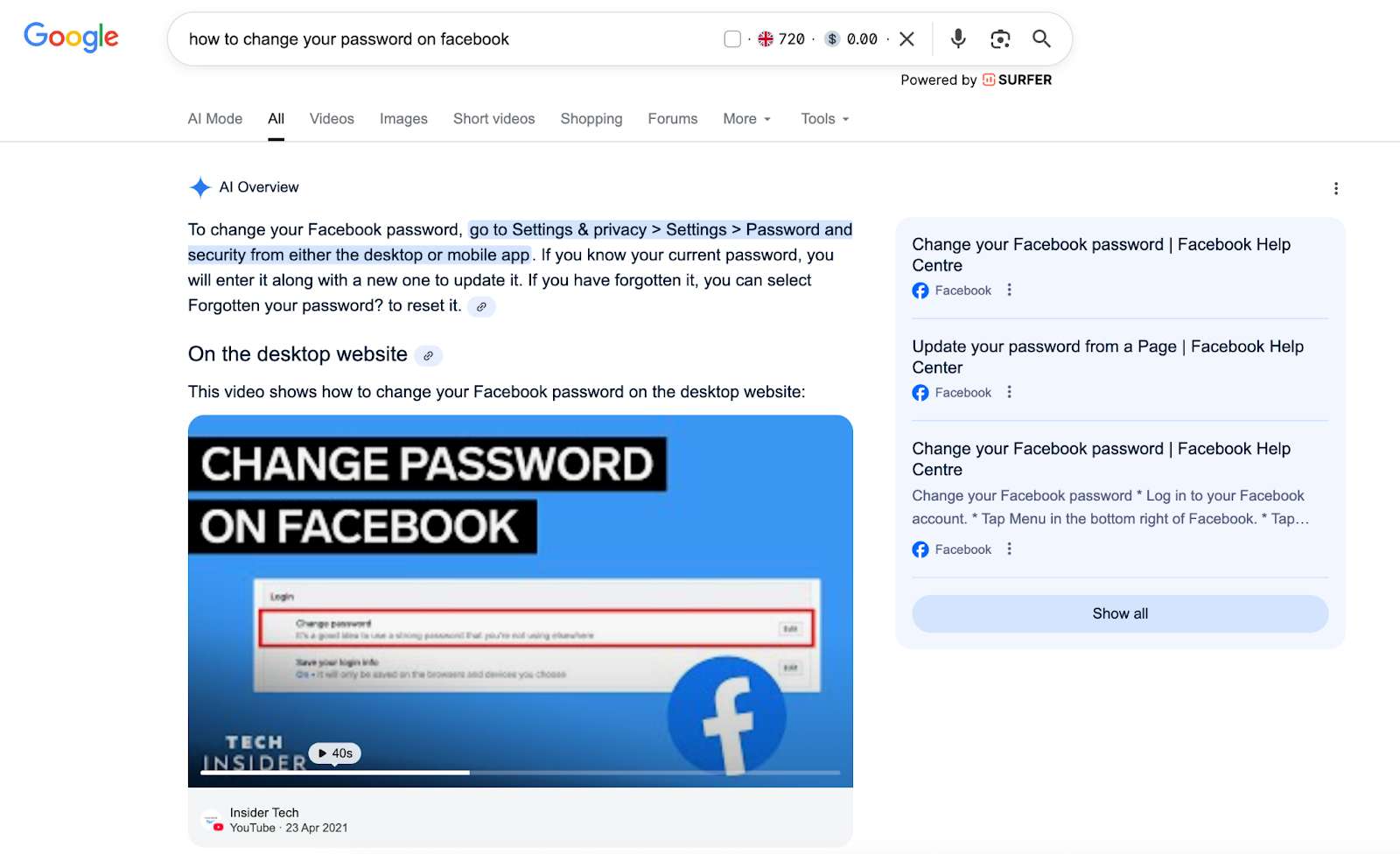
Google’s goal is simple: answer the question fast and solve for user intent. Great for users, not so great for organic traffic.
Google’s AI overview pulls information from various websites and sources and links them in the sidebar on the right. Although the AI overview takes up a significant amount of space, you can still appear as a source brand in the right-hand column, where users can click for more information.
Second, tools like ChatGPT, Perplexity, and Claude turned into alternative search platforms almost overnight. People now ask AI directly instead of typing their question into Google. And because these tools summarize information instantly, users often never visit the original sources.
Here’s an example of the same query but using ChatGPT.
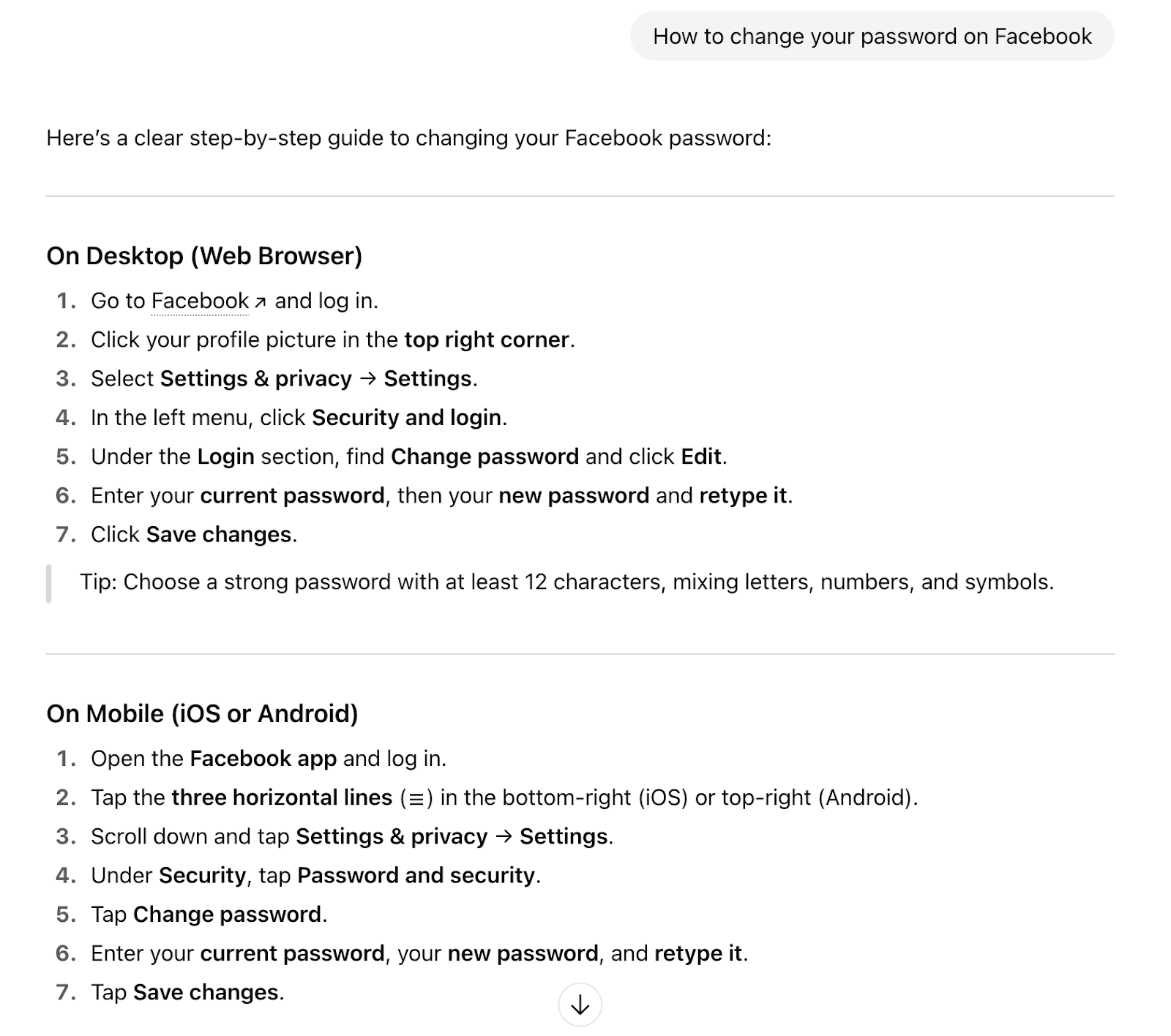
As you can see in the image above, ChatGPT provides a sufficient answer to user queries, reducing the need for users to visit your previously appreciated guide.
On top of that, the internet has been flooded with content slop—AI‑generated articles that all sound the same. Because anyone can now produce hundreds of posts a month, search results are packed with bland, repetitive content that doesn’t actually help anyone.
People don’t just “Google” things anymore. They:
- Check TikTok for how‑to tutorials
- Go to Reddit for honest product opinions
- Use YouTube as their main learning platform
- Search Amazon for reviews
- Treat Pinterest as a visual search engine
“In our studies, something like almost 40% of young people, when they’re looking for a place for lunch, they don’t go to Google Maps or Search, they go to TikTok or Instagram.”
– Prabhakar Raghavan, Senior Vice President at Google
Search is everywhere and different platforms serve different intents.
With all of this happening at once, it’s easy to see why some people may think that SEO must be dead.
SEO for 2026 means understanding how people look for information across multiple platforms, creating content worth citing, and building a brand that AI platforms recognize and trust.
Adapting your SEO strategy for 2026
SEO now overlaps with:
- PR and brand building
- content design and UX
- data journalism
- community-driven authority (Reddit, YouTube, Discord)
- LLM optimization
It’s no longer keyword research and on-page optimization. Here are 3 fundamental pillars to optimize your SEO strategy in 2026.
1. Practice SEO fundamentals
Practice SEO fundamentals
As stats show, SEO first principles haven’t changed because content value makes your site worth citing, surfacing, and trusting across platforms whether it's traditional SERPs, or AI citations.
Here’s what “fundamentals” actually mean in 2026:
Build content around experience and proof, not summaries.
Google and AI systems now look for signals that you’ve done the thing you’re talking about—original insights, data, screenshots, real workflows, or firsthand expertise.
Demonstrate E-EAT on your pages with first hand insights and case studies. You can even use AI to create an evaluation criterion by uploading Google’s guidelines and asking ChatGPT to review and rate your content using these standards.
Note that this isn't a way to decipher Google's algorithm, but ChatGPT can act as an editor to help improve your content based on a provided framework.
See the image below for an example prompt you could use.
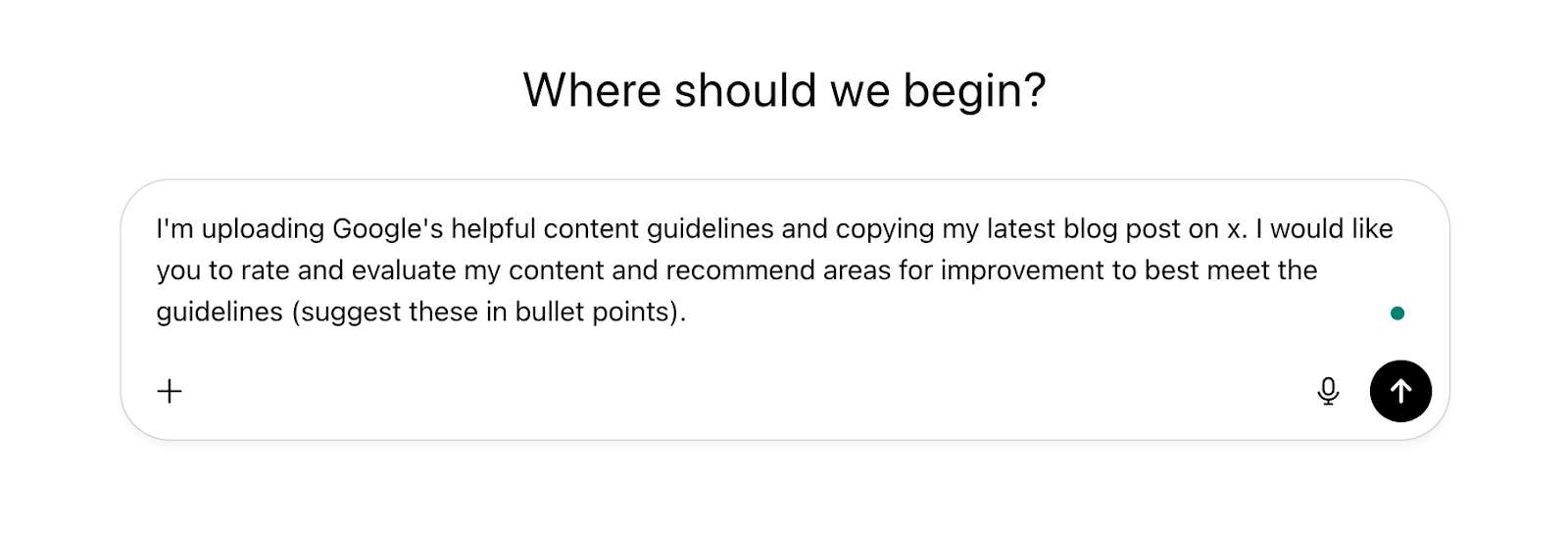
If you have a premium subscription, create a custom GPT for content evaluation. Here's an example of critical feedback from a custom GPT that Surfer's team uses.
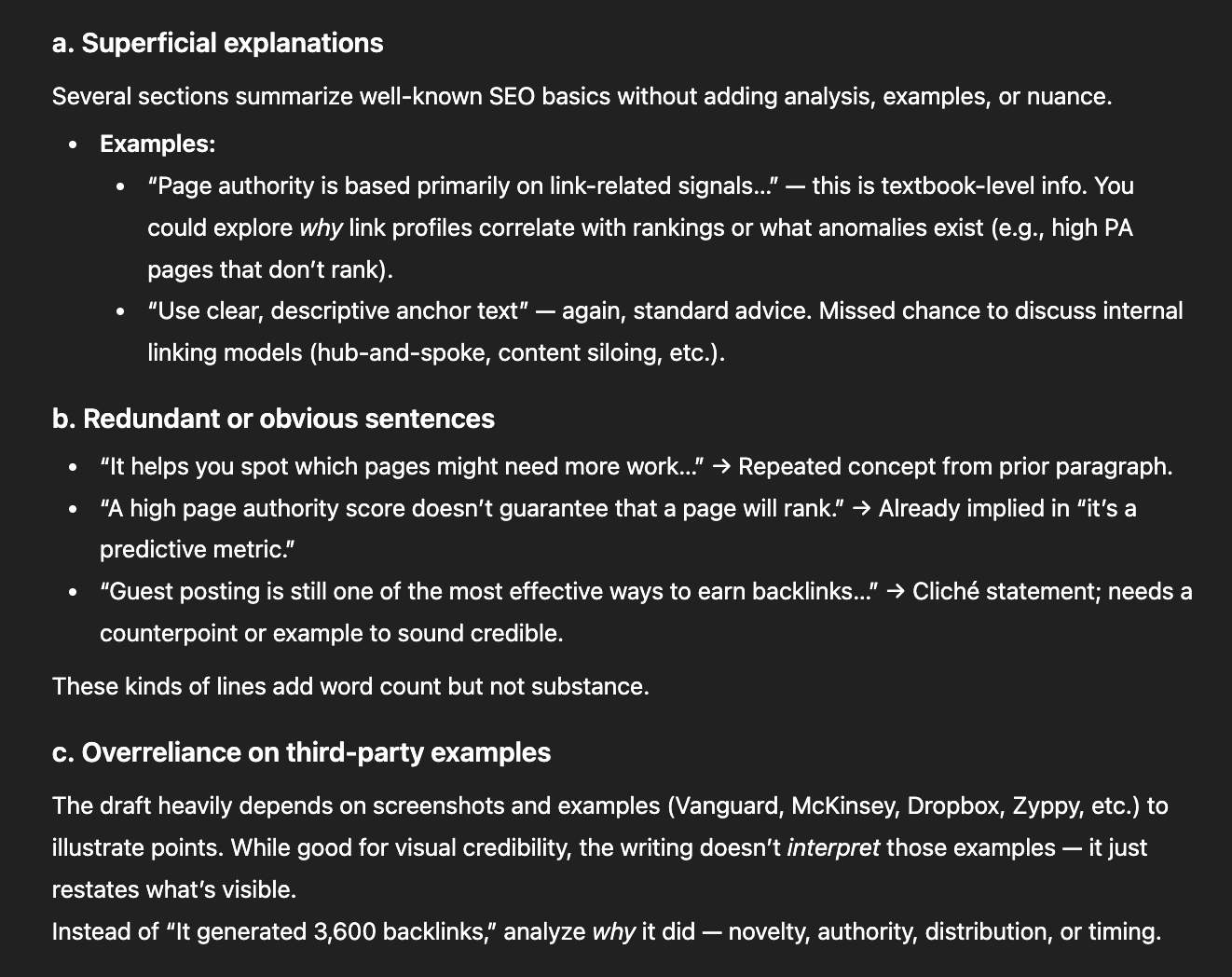
Strengthen your site’s technical health.
Fast load times, clean architecture, strong internal linking, and mobile performance are minimum requirements for your pages to rank.
This is foundational, so shouldn't be news to anyone.
Consolidate topical depth for authority.
Covering a topic comprehensively matters more than publishing endlessly. Google and AI models rely heavily on entities (brands, authors, products, concepts).
The clearer your entity signals—consistent naming, quality content, press mentions—the easier it is for AI systems to identify and trust you.
Audit content ruthlessly.
Delete, merge, or overhaul pages that no longer serve a purpose. Pruning thin content is just as important as creating new content.
Think of these fundamentals as your SEO “infrastructure.” Without strong technical, topical, and credible signals, no amount of optimization for LLMs or AI overviews will matter.
2. Ensure your content is LLM-friendly
Optimizing for LLMs in 2026 isn’t about putting your products in "best" listicles or covering all kinds of long‑tail keywords even if that is what is working at the moment.
Structure your content so AI systems can parse it and present it accurately. Write in a format that machines can reliably extract. The good news is that you should have already been doing most of these things for SEO anyway, so you dont have to take any huge leaps for AI content optimization.
Here’s how to make your content LLM‑ready:
- Structure your content since LLMs rely on clean sectioning, clear headings, tight paragraphs, and explicit definitions.
- Answer questions directly before adding nuance. Provide a crisp, unambiguous answer before expanding. This can help your page easier for AI to summarize without misinterpreting you.
- Answer questions for specific use cases for your product or service. For example, Instead of “how to improve email marketing,” give the actual scenario,“How to increase email open rates when your list is stagnating.” Being specific may improve AI visibility because it reduces hallucination risk.
For example, searching for "how to save money fast on a low income" on Google highlights several ways to save, with drop-down sections leading to specific answers.
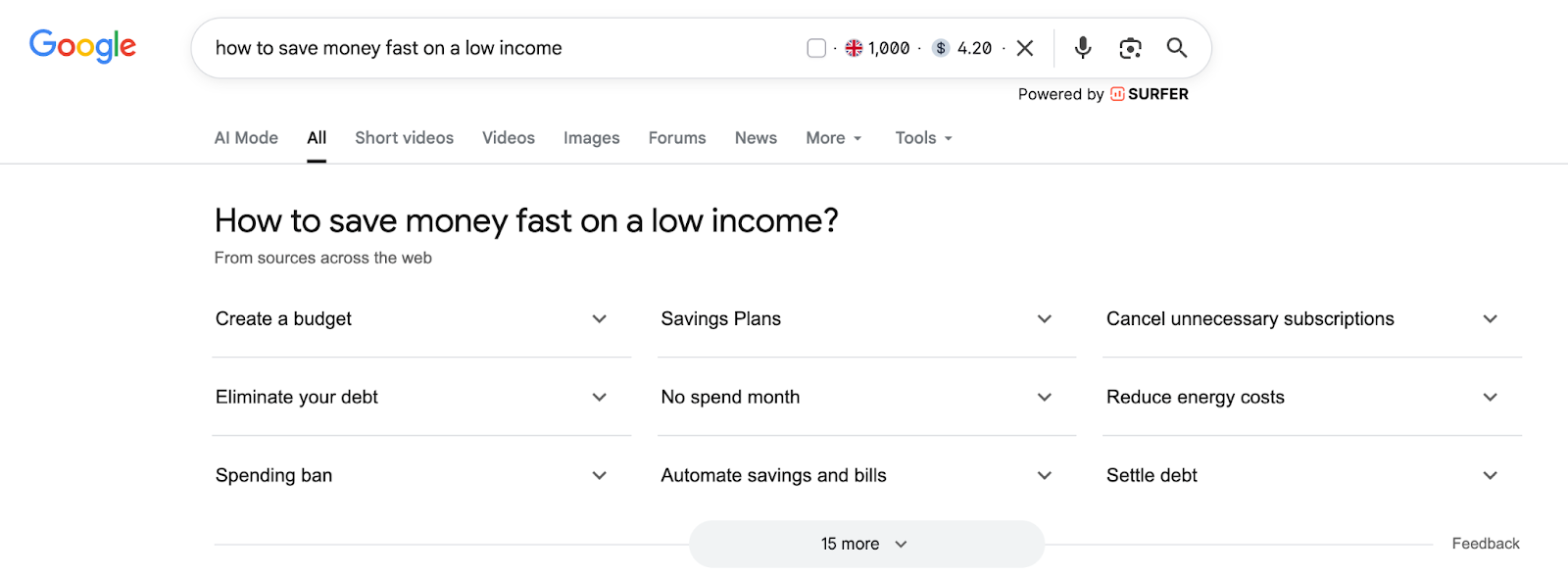
You can use these as research to address long-tail specific questions.
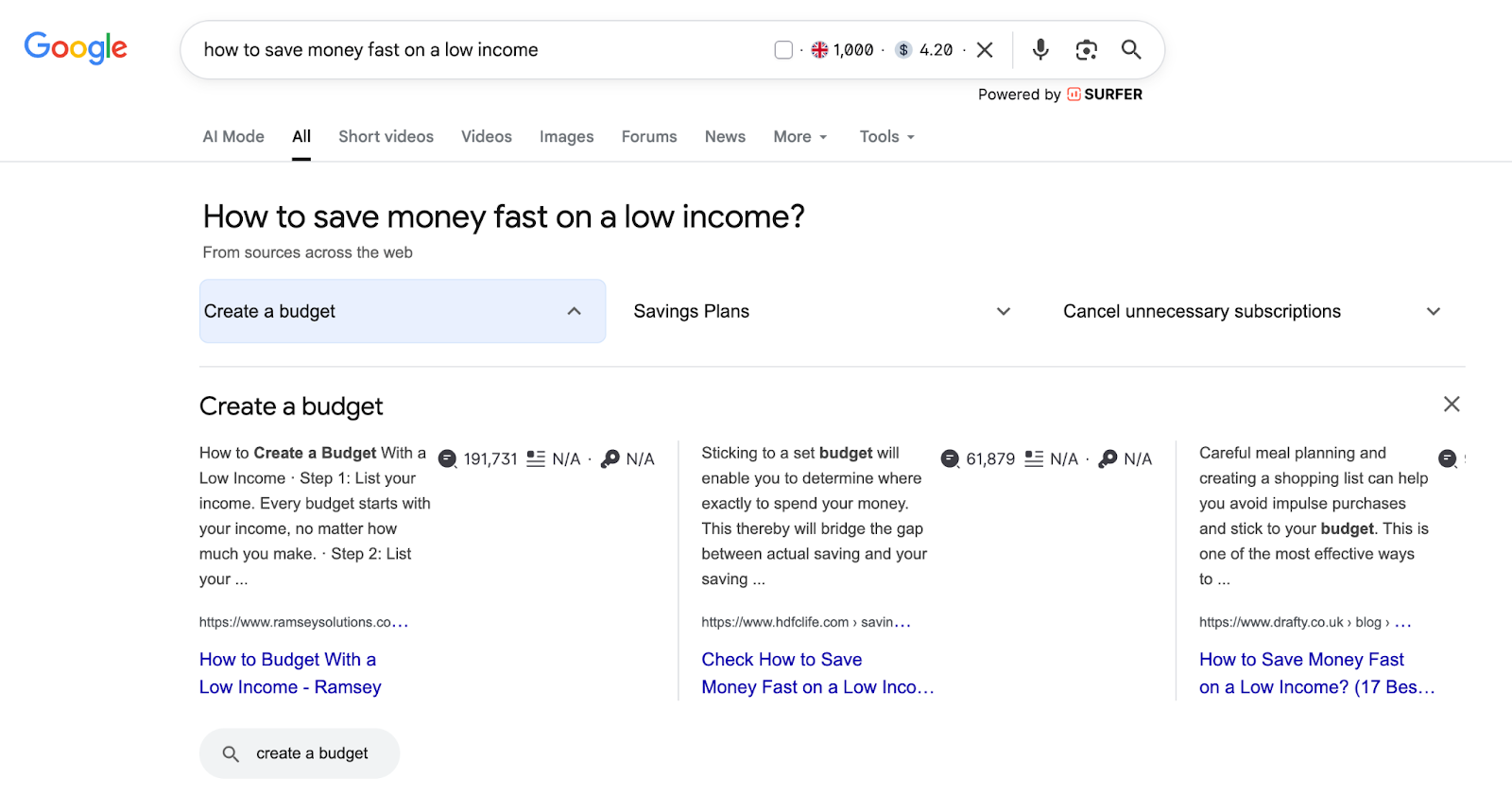
Address only your most relevant queries since otherwise you could end up with hundreds of long-tail questions to answer. Focus on your top 10-20% of target keywords that will drive 80% of volume.
LLMs can pick up the correct context from your content if it applies to a similar query.
- Add verifiable statements and concrete data. Use stats, numbers, named entities, and real tools to increase how likely AI is to cite you.
- Use formats LLMs love: tables, comparisons, steps, definitions. These are easy to extract and reference.
We've already discussed entity signals for more citations and mentions. To strengthen brand visibility:
- Earn coverage from trusted publications
- Ensure your brand/entity appears in major directories and databases
- Publish data‑driven or opinionated content that gets quoted
- Build social presence that reinforces your topical identity
- Contribute to reputable sites where your brand is listed alongside experts
And dont forget to monitor your AI search visibility across LLM platforms. Realign your KPIs to include:
- Brand searches
- Mentions in AI tools like ChatGPT, Claude and Perplexity
- Frequency of mentions
Create original content, research, and expert insights
I addressed this point earlier but am reiterating it here because it remains one of the most effective ways you can improve your brand's visibility online.
AI has eliminated the value of generic information. If your content simply explains “what something is” or provides a basic how‑to, LLMs can now do that instantly and often more clearly. These queries no longer drive reliable traffic.
Instead, create original research, case studies, and customer usage data to give LLMs and search engines a reason to cite you, especially if the content is not available anywhere else. With most content not adding much value, adding unique data and insights to your content helps you stand out.
When ChatGPT or Perplexity needs to name a source, it prefers brands with strong entity signals, real experts, and proprietary insights. The bar for trust is higher than it’s ever been.
Google’s helpful content guidelines also explicitly encourage marketers to add original information.
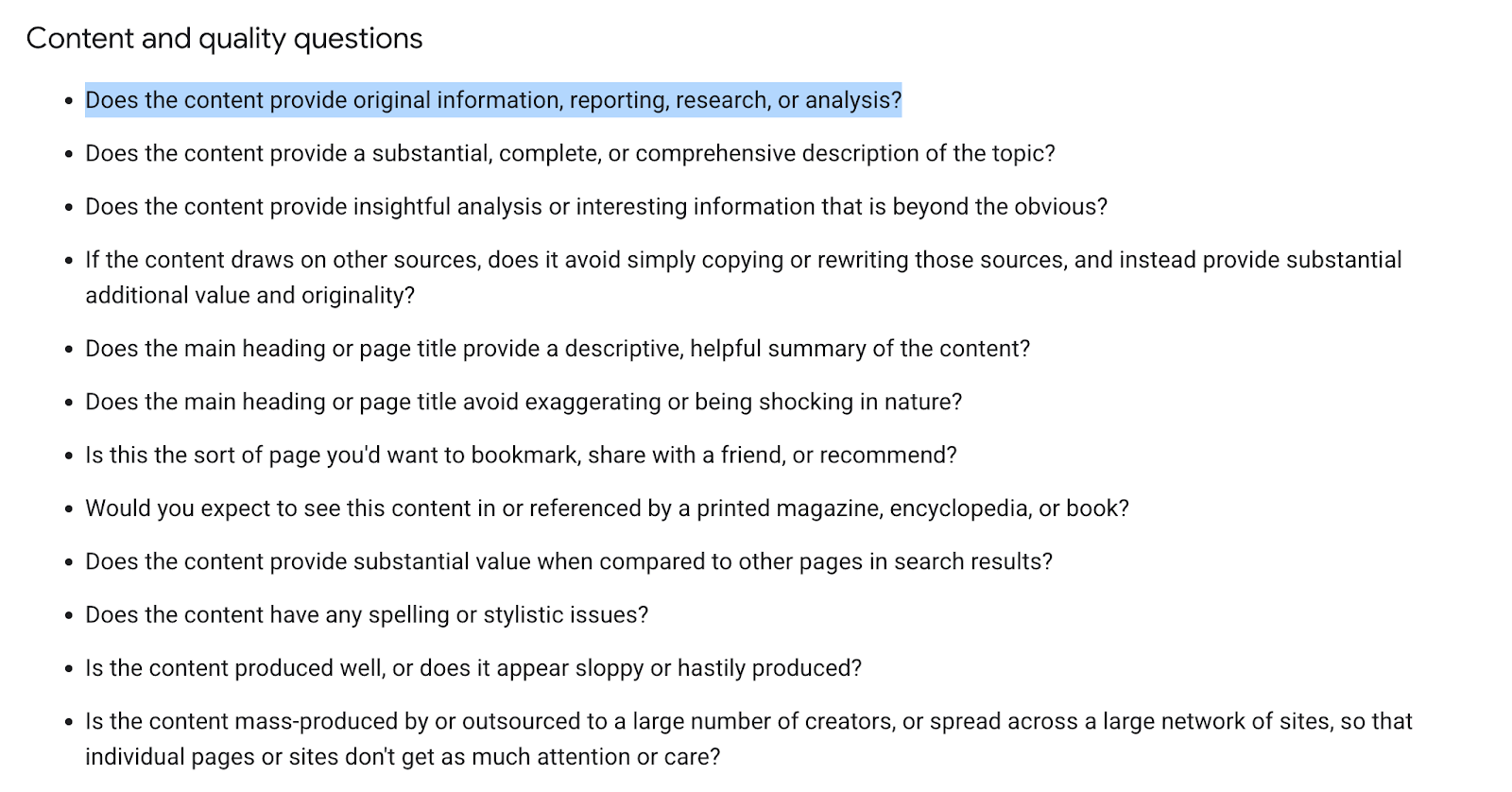
Combine original data and expert commentary to give AI systems something unique to cite and signal trustworthiness, authority, and real-world experience.
Here are some ways you can use data in your content:
- Run surveys, analyze anonymized user behavior, surface product patterns, or publish performance benchmarks for your industry.
- Use sales calls, support tickets, customer onboarding issues, internal experiments as material. These contain firsthand insights that can position you as a credible leader.
- Document A/B tests, optimization attempts, failed strategies and unexpected outcomes that humanize your brand.
Think of Gallup’s annual workplace report that ChatGPT cites as an example. It contains original research data from thousands of employees worldwide.
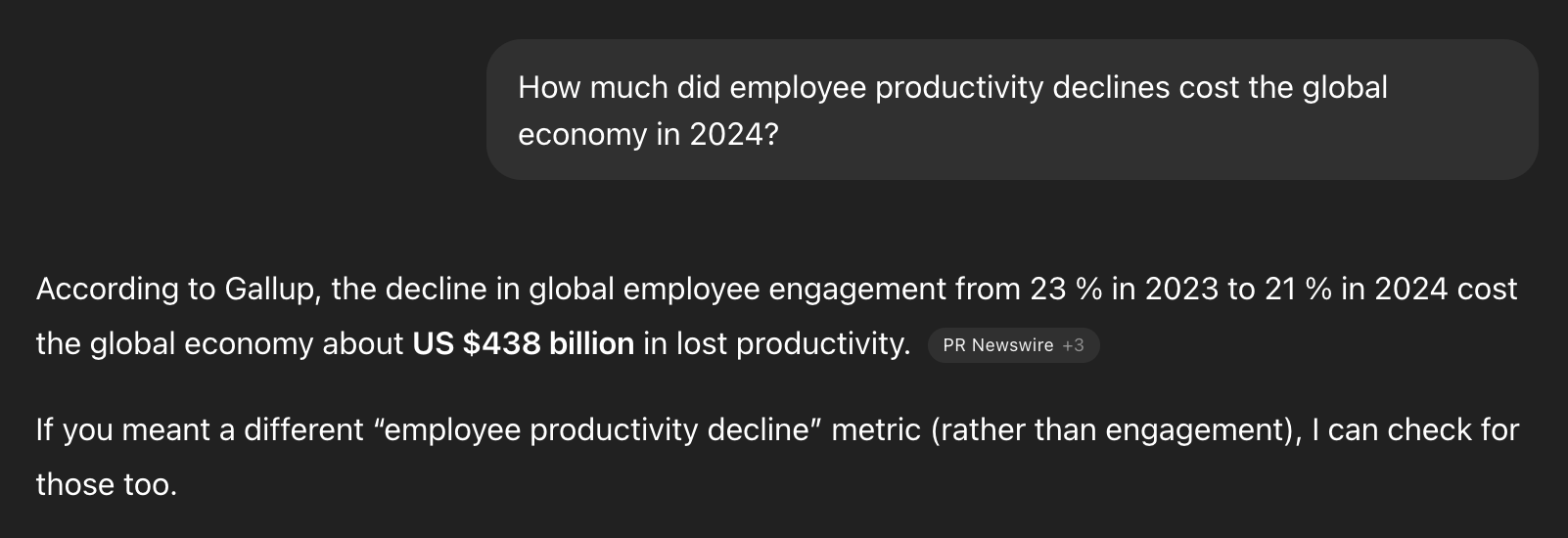
Bring in subject-matter experts to interpret what the numbers mean, not just what they are.
In Google’s helpful content guidelines mentioned above, several outlined questions suggest that expert insights and quotes can help improve search rankings. These questions, taken directly from the guidelines, indicate that including expert quotes is an effective way to create valuable content.


There is also a specific section labelled. “Expertise questions.”

This entire section hints that adding expertise to your content can help improve content quality and rankings.
Here’s an example from Lost Earth Adventures on how to start rock climbing. They include an author bio and clearly highlight the author’s certifications and expertise.
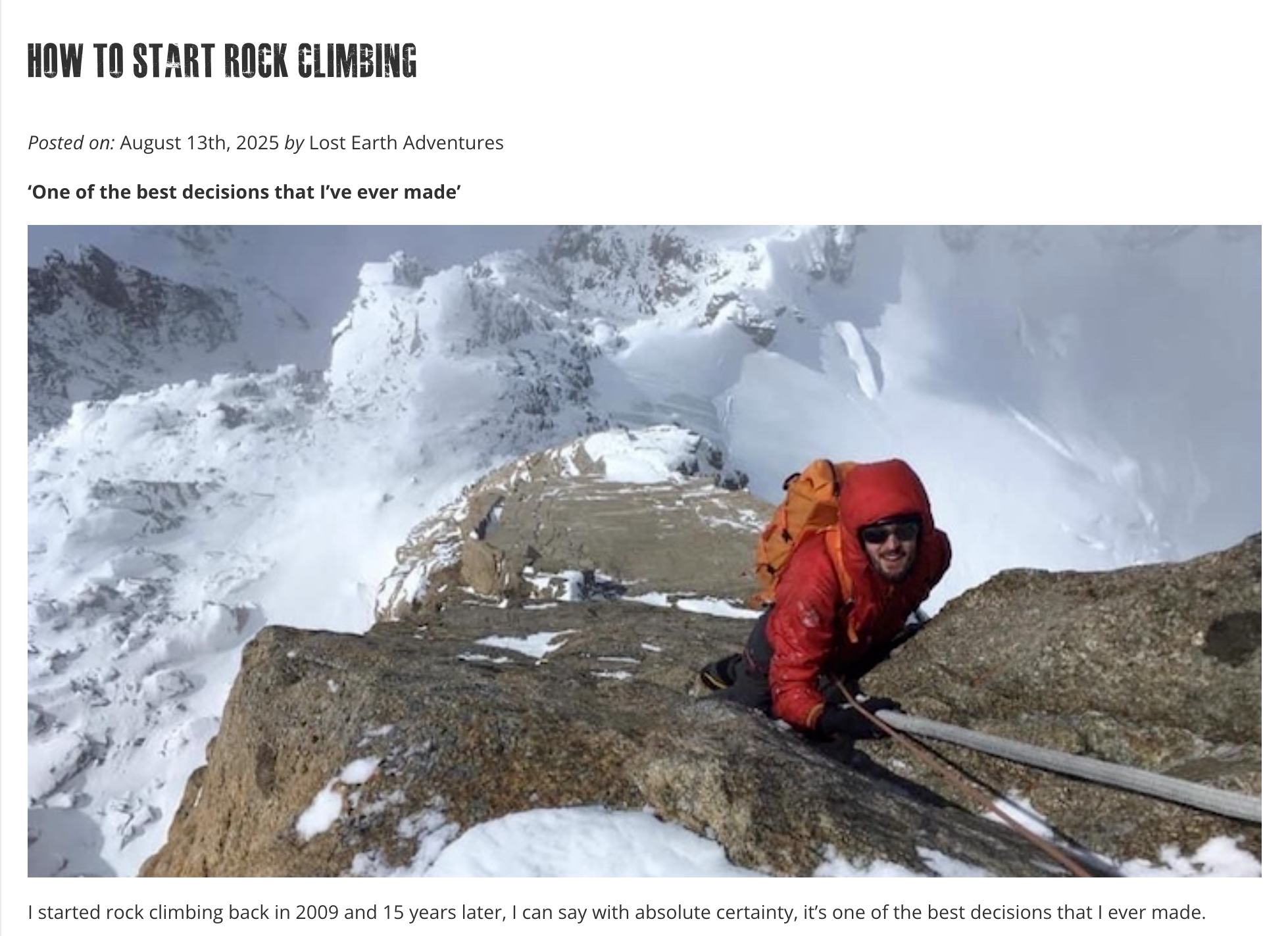
It’s a good idea to have an author page with more details, too.

Did AI results kill SEO?
AI hasn't killed SEO, but has changed the way people search. More people are relying on AI tools like ChatGPT and social media platforms to answer their queries. Since Google has prioritized AI generated summaries in the search results, websites are seeing significantly lower traffic.
Being “ranked #1 on Google” doesn’t guarantee clicks anymore. But being:
- cited in an AI overview
- named in a ChatGPT recommendation
- referenced by Perplexity
- linked in a Reddit thread
- surfaced in TikTok search
does drive meaningful discovery.
So no, SEO isn’t dead. SEO is now about content optimization across multiple channels, not just Google.
SEO in the AI era is making your expertise, data, and brand discoverable across every platform where people ask questions.
Is SEO still important in 2026?
Yes! SEO is still important in 2026, even if you hear people say, “SEO is dead.”
Nevertheless, SEO as you know it has definitely changed. If your content strategy consists of finding low-difficulty keywords and writing blog content to hit a word count, I recommend updating your playbook.
You need to take into account AI generated content and how this has impacted search results and search engine rankings.
Search is now about visibility, not just rankings.
Key takeaways
- Many SEOs and marketers claim that SEO is dead, but this is not true
- SEO has evolved and will continue to evolve to keep pace with generative AI
- Content teams must adapt their SEO strategies to appear in LLMs and AI overviews
- Focus on creating high quality content for search engines, LLMs, and AI overviews
- Ranking on the first page of Google is no longer enough to guarantee traffic
- Brand mentions are becoming a more important metric to track





